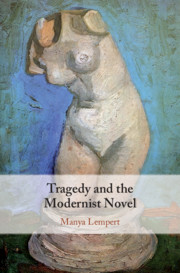Book contents
- Tragedy and the Modernist Novel
- Tragedy and the Modernist Novel
- Copyright page
- Dedication
- Contents
- Acknowledgments
- Chapter 1 Introduction
- Chapter 2 Hardy’s Theory of Tragic Character
- Chapter 3 Woolf and Darwin
- Chapter 4 Camus’s Modernist Forms and the Ethics of Tragedy
- Chapter 5 Beckett
- Notes
- Bibliography
- Index
Chapter 3 - Woolf and Darwin
Tragic Time Scales and Chances
Published online by Cambridge University Press: 20 August 2020
- Tragedy and the Modernist Novel
- Tragedy and the Modernist Novel
- Copyright page
- Dedication
- Contents
- Acknowledgments
- Chapter 1 Introduction
- Chapter 2 Hardy’s Theory of Tragic Character
- Chapter 3 Woolf and Darwin
- Chapter 4 Camus’s Modernist Forms and the Ethics of Tragedy
- Chapter 5 Beckett
- Notes
- Bibliography
- Index
Summary
Woolf calls Hardy “the greatest tragic writer among English novelists,” and I argue that she shares his tragic sense. Both a “Dionysiac” view of time as unceasing flux (the view held by Friedrich Nietzsche, Jane Ellen Harrison, and Henri Bergson) and a mathematical view of time as abstract continuum (the view held by Bertrand Russell) make for tragedy in Woolf’s fiction. Her novels are devoid of the ritual and mythic consolations so often misattributed to ancient drama. Woolf’s Dionysiac time is severed from Dionysiac rituals’ cyclical renewals. Woolf’s mathematical time is severed from redemptive myth. Like Darwin, Woolf makes tragic chance inseparable from the theater of life. Woolf depicts the nonteleological, nonanthropocentric change and persistence of nonhuman nature, as well as the inhuman permanence of Russell’s “universals.” To the Lighthouse and The Waves set the “still space” of characters’ most cherished moments against “the waste of ages and the perishing of the stars.” Woolf’s fiction accentuates time’s passing and models characters’ Sisyphean resistance to it.
Keywords
- Type
- Chapter
- Information
- Tragedy and the Modernist Novel , pp. 65 - 107Publisher: Cambridge University PressPrint publication year: 2020

